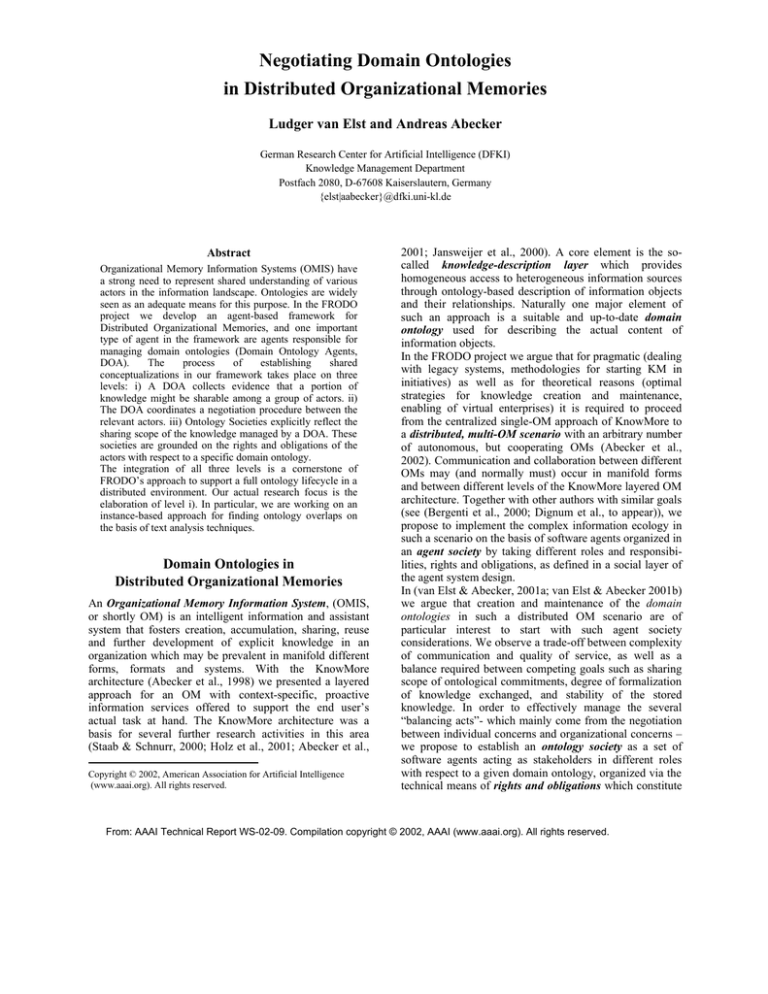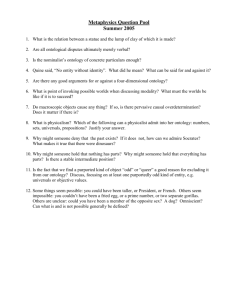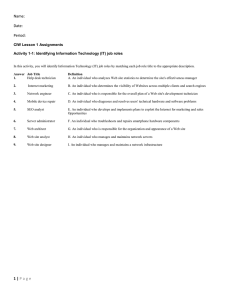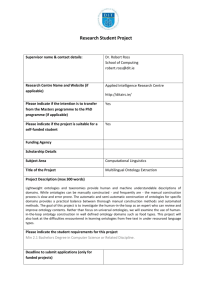
Negotiating Domain Ontologies
in Distributed Organizational Memories
Ludger van Elst and Andreas Abecker
German Research Center for Artificial Intelligence (DFKI)
Knowledge Management Department
Postfach 2080, D-67608 Kaiserslautern, Germany
{elst|aabecker}@dfki.uni-kl.de
Abstract
Organizational Memory Information Systems (OMIS) have
a strong need to represent shared understanding of various
actors in the information landscape. Ontologies are widely
seen as an adequate means for this purpose. In the FRODO
project we develop an agent-based framework for
Distributed Organizational Memories, and one important
type of agent in the framework are agents responsible for
managing domain ontologies (Domain Ontology Agents,
DOA).
The
process
of
establishing
shared
conceptualizations in our framework takes place on three
levels: i) A DOA collects evidence that a portion of
knowledge might be sharable among a group of actors. ii)
The DOA coordinates a negotiation procedure between the
relevant actors. iii) Ontology Societies explicitly reflect the
sharing scope of the knowledge managed by a DOA. These
societies are grounded on the rights and obligations of the
actors with respect to a specific domain ontology.
The integration of all three levels is a cornerstone of
FRODO’s approach to support a full ontology lifecycle in a
distributed environment. Our actual research focus is the
elaboration of level i). In particular, we are working on an
instance-based approach for finding ontology overlaps on
the basis of text analysis techniques.
Domain Ontologies in
Distributed Organizational Memories
An Organizational Memory Information System, (OMIS,
or shortly OM) is an intelligent information and assistant
system that fosters creation, accumulation, sharing, reuse
and further development of explicit knowledge in an
organization which may be prevalent in manifold different
forms, formats and systems. With the KnowMore
architecture (Abecker et al., 1998) we presented a layered
approach for an OM with context-specific, proactive
information services offered to support the end user’s
actual task at hand. The KnowMore architecture was a
basis for several further research activities in this area
(Staab & Schnurr, 2000; Holz et al., 2001; Abecker et al.,
Copyright © 2002, American Association for Artificial Intelligence
(www.aaai.org). All rights reserved.
2001; Jansweijer et al., 2000). A core element is the socalled knowledge-description layer which provides
homogeneous access to heterogeneous information sources
through ontology-based description of information objects
and their relationships. Naturally one major element of
such an approach is a suitable and up-to-date domain
ontology used for describing the actual content of
information objects.
In the FRODO project we argue that for pragmatic (dealing
with legacy systems, methodologies for starting KM in
initiatives) as well as for theoretical reasons (optimal
strategies for knowledge creation and maintenance,
enabling of virtual enterprises) it is required to proceed
from the centralized single-OM approach of KnowMore to
a distributed, multi-OM scenario with an arbitrary number
of autonomous, but cooperating OMs (Abecker et al.,
2002). Communication and collaboration between different
OMs may (and normally must) occur in manifold forms
and between different levels of the KnowMore layered OM
architecture. Together with other authors with similar goals
(see (Bergenti et al., 2000; Dignum et al., to appear)), we
propose to implement the complex information ecology in
such a scenario on the basis of software agents organized in
an agent society by taking different roles and responsibilities, rights and obligations, as defined in a social layer of
the agent system design.
In (van Elst & Abecker, 2001a; van Elst & Abecker 2001b)
we argue that creation and maintenance of the domain
ontologies in such a distributed OM scenario are of
particular interest to start with such agent society
considerations. We observe a trade-off between complexity
of communication and quality of service, as well as a
balance required between competing goals such as sharing
scope of ontological commitments, degree of formalization
of knowledge exchanged, and stability of the stored
knowledge. In order to effectively manage the several
“balancing acts”- which mainly come from the negotiation
between individual concerns and organizational concerns –
we propose to establish an ontology society as a set of
software agents acting as stakeholders in different roles
with respect to a given domain ontology, organized via the
technical means of rights and obligations which constitute
From: AAAI Technical Report WS-02-09. Compilation copyright © 2002, AAAI (www.aaai.org). All rights reserved.
the specific roles in a given ontology society (van Elst &
Abecker, 2001a; van Elst & Abecker 2001b).
A central mechanism in such a multi-OM scenario is the
communication between different OMs which might refer
to different domain ontologies. In the next section we
briefly sketch three “levels of harmonization” which
stepwise bridge understanding gaps and enable meaning
negotiation. In the subsequent section we give a simple
example which shows how to support the ongoing
evolution of domain ontologies and mediation knowledge
going through these three steps.
The FRODO Ontology Evolution Approach
Evidences for Ontology Matches
The most basic activities for implementing ontology
negotiation processes concern noticing an ontology
mismatch and finding potential ontology mapping
operations. In the literature mainly evidence for ontology
merging operations are mainly based on some
combination of evidence from two sources (see, e.g.
(McGuiness et al., 2000a; McGuiness et al., 2000b; Dieng
& Hug, 1998)):
a) Term-based evidence considers the textual description
(i.e., the “name”) of a concept in an ontology.
b) Topology-based evidence considers the structure of the
concept graph representing (mostly) the is-a hierarchy of
the ontology.
In the case of an OM application where ontology concepts
are used for indexing and retrieving (in the general case,
multimedia, but today normally mainly text) documents
there is at least one further possibility, namely gathering
instance-based evidence (see also (Lacher & Groh, 2001)).
Here, the idea is to compare documents (or, better
document sets) indexed with certain ontology concepts
using text analysis and document understanding techniques.
If, for instance, the set of documents indexed with concept
A of one ontology is considered by some document
comparison algorithms very similar to a set of documents
indexed with concept B in another ontology, it could be a
good idea to consider A and B to represent the same
concept.
For experimenting with this idea, we implemented a
domain ontology agent by adding agent communication
facilities with the JADE1 agent platform to the Protégé2
tool for ontology development, and coupled it with the
mindAccess3 document analysis software. First results will
be presented at the workshop.
A topic which still seems to be a bit neglected is the
aggregation of evidences for determination of candidate
ontology-merging operations. Obviously concepts in two
1
http://sharon.cselt.it/projects/jade/
http://protege.stanford.edu/index.shtml
3
http://www.im-insiders.de/download/mindaccess_engl.pdf
2
ontologies under consideration are merging candidates if
we find arguments for a sufficient degree of similarity
between them. The notion and use of similarity in (Dieng &
Hug, 1998), for example, suggests to think about the notion
of similarity in Case-Based Reasoning which has been
developed up to a considerably sophisticated stage (cp.
(Wess, 1996)). Taking into account that an ideal
aggregation mechanism would have to deal with different
kinds of evidence (term-based, structure-based, instancebased), coming with different degrees of confidence,
maybe with conflicting evidences, maybe with some degree
of ignorance, it stands to reason whether such a mechanism
should not be based on a strong mathematical foundation,
as e.g. suggested by Richter’s grounding of similarity in
CBR on Dempster and Shafer’s theory of evidence
(Richter, 1995; Kohlhas & Monney, 1994). We did not yet
work into this direction, but it is straightforward how to
apply this theory in the given scenario, and it seems an
interesting question for the workshop discussion whether
the participants think such a step relevant and necessary or
over-formalized.
Communication for Ontology Negotiation
If two agents detect a negotiation need regarding their
respective ontologies, two ingredients are required to
enable successful communication:
• Speech acts for meaning negotiation provide the
appropriate primitives for talking about suggestions,
questions, answers, and decisions about negotiating
meaning between two agents. In (van Elst & Abecker,
2001a; van Elst & Abecker, 2001b) we started with a
top-level analysis of the required expressiveness, which
is mainly determined by the representation means of the
underlying ontology formalism and the wished merging
operations. In the workshop we will present a FIPAcompliant description of our proposed performatives for
negotiating
about
a
TRIPLE
ontology
(http://www.dfki.uni-kl.de/frodo/triple/).
• A negotiation protocol describes the process how two
agents can come to an agreement about a meaning
negotiation question. In FRODO we did not yet
investigate this topic. However, (Bailin & Truszkowski,
2001) made a proposal which seems a good starting
point to work from.
Ontology Society Framework
As already mentioned above, we see ontology lifecycle
management as an integral part of a comprehensive agent
society for managing distributed OMs. Other kinds of
agents comprise, e.g. user agents, information retrieval
agents, process and task agents, etc. With the FRODO
agent platform (Abecker et al., 2002) we provide the basis
for setting up such complex systems and defining their
social layer with the concepts of actor roles defined via
agents’ rights and obligations which are a subset of their
competencies. The FRODO agent platform is currently
being implemented on top of JADE. In (van Elst &
Abecker, 2001a; van Elst & Abecker, 2001b) we introduce
six kinds of ontology agents described below in terms of
the speech acts they are allowed, or obliged, respectively,
to use with respect to a specific ontology in quest:
• Passive Users are members of an Ontology Society who
intend just to use the respective domain ontology.
Because they are only consumers, they are not obliged to
any services. On a voluntary basis they can suggest
ontology updates.
• The role of Associate Users is similar to the consumer
role of Passive Users. However, Associates have the
additional right to receive updates of the ontology
whenever they want (e.g., when the ontology has
changed), i.e., this role defines a kind of subscription
service for a domain ontology.
• Partner Users have not only the right to use a domain
ontology, but also committed themselves to help
improving it by suggesting ontology updates, e.g. on the
basis of quality feedback wrt. ontology exploitation.
• Ontology Experts are obliged to answer queries about a
domain ontology.
• In addition to Experts, an Editor of a domain ontology is
also responsible for ontology maintenance. The editor
accepts update suggestions from the various users,
negotiates possible updates with the partners and tries to
guarantee global quality criteria of the domain ontology
(e.g., soundness). The editor also realizes the service for
all ontology society members with the right to receive
update notifications. Furthermore, the editor manages
the social model of “its” ontology society. This means,
the editor knows the associations between roles and
rights/obligations as well as which roles are enacted by
the various actors. In particular, the editor grants roles
(e.g., negotiates rights and obligations) to the applicants
that want to join the ontology society.
Passive Associate Partner Expert Editor
User
User
User
R
R
R
R
R
R
R
R
R
Query
Receive
Update
Suggest
R
Update
Answer
Queries
Edit
Send Upd.
Notif.
Grant
Guarantees
Guarantee
Quality
R
R/O
R
R/O
R/O
R
Based upon these specifications we define Domain
Ontology Agents (DOA) and Distributed Domain
Ontology Agents (D²OA) which are responsible for
ontologies within one OM, or are located between several
OMs to facilitate cross-OM communication, respectively.
Typical questions to DOAs are “What are the subconcepts
of concept A?” whereas D²OAs answer questions like
“Which OM contains concepts like A and B?” or “What
does A mean in OMy?”. In terms of the roles mentioned
above, both DOAs and D²OAs typically enact the role of
Ontology Experts and Ontology Editors.
Imagine for example two groups of experts, one for domain
D1, one for domain D2. Each group negotiates its own
domain ontology managed by DOAD1 and DOAD2,
respectively. D²OA has knowledge what these ontologies
are about and tries to identify points of contact or overlaps
between them. Then, D²OA initiates a negotiation
procedure between DOAD1 and DOAD2. The result might
be a common upper level ontology or a mapping for some
parts of the ontologies. So, in general, the architecture can
handle three levels of negotiated meaning:
a) Level 1 („No shared conceptualization“): Neither the
local ontology agents (DOAD1, DOAD2) nor the D²OA
have an explicit agreement on the ontological level. In
this case, to enable some level of communication
techniques are applied which do not rely on a shared
vocabulary (e.g., text retrieval). Communication on this
level is monitored by D²OA.
b) Level 2 („Ontology Mapping“): D²OA maintains
mapping rules between the ontologies of the two local
Domain Ontology Agents. These rules are based on the
evidence gained by low-level communication on level 1.
c) Level 3 („Ontology Negotiation“): In case of high
evidence for overlap, a negotiation process is initiated by
D²OA. Possible outcomes are, e.g., that the two local
DOAs do not want to establish are shared
conceptualization or that they define a common top-level
ontology. If the two ontologies agree to have some part
of their domain ontologies in common, this results in a
change of the underlying role model. This would have an
effect on further developments of this part of the
ontology, because both are now responsible, i.e., each
change has to be preceded by a negotiation step as
defined by the agent’s roles (cf. Table 1).
Summary
R
R/O
R
O
Table 1: Example Rights (R) and Obligations (O)
of Ontology Agents
Three major points describe our research approach for
meaning negotiation in distributed OM applications:
• The use of text analysis techniques for instance-based
evidence finding (which is possible because our
ontologies are embedded into the distributed OM usage
scenario) offers new, rarely investigated, but practical
possibilities.
• The formally sound examination of evidence aggregation
seems a pretty new topic.
• The management of meaning negotiation questions as an
integral part of a comprehensive ontology society
approach allows full lifecycle support for ontologies in
OMs.
Jansweijer, W., van de Stadt, E., van Lieshout, J., and
Breuker, J. 2000. Knowledgeable Information Brokering.
In: European eBusiness and eWork Conference 2000,
Madrid.
References
Kohlhas, J., and Monney, P.A. 1994. Theory of Evidence A Survey of its mathematical Foundations, Applications
and Foundational Aspects. ZOR 39, 1994, pp. 35-68.
Abecker, A., Bernardi, A., van Elst, L., Lauer, A., Maus,
H., Schwarz, S., and Sintek, M. 2002. FRODO: A
Framework for Distributed Organizations - Milestone M1:
Requirements Analysis and System Architecture. DFKI
Document D-01-01, Kaiserslautern.
Abecker, A., Bernardi, A., Hinkelmann, K., Kühn, O., and
Sintek, M. 1998. Towards a Technology for Organizational
Memories. IEEE Intelligent Systems, May/June 1998.
Abecker, A., Bernardi, A., Ntioudis, S., Herterich, R.,
Houy, C., Legal, M., Mentzas, G., and Müller, S. The
DECOR Toolbox for Workflow-Embedded Organizational
Memory Access. 2001. In: ICEIS 2001, 3rd Int. Conf. on
Enterprise Information Systems, Setúbal, Portugal.
Bailin, S.C., and Truszkowski, W. 2001. Ontology
negotiation using JESS. In Proc. 3rd Int. Conference on
Enterprise Information Systems, ICEIS-2001, Setúbal,
Portugal.
Bergenti, F., Poggi, A., and Rimassa, G. 2000. Agent
Architectures and Interaction Protocols for Corporate
Management Systems. In Proc. ECAI Workshop on
Knowledge Management and Organisational Memories,
pp. 39-47, Berlin, Germany.
Dieng, R., and Hug, S. 1998. Comparison of "Personal
Ontologies" Represented through Conceptual Graphs. In:
13th European Conference on Artifical Intelligence
(ECAI'98), Brighton, UK.
Dignum, V., Meyer, J.J., and Weigand, H. to appear.
Towards an Organizational Model for Agent Societies
Using Contracts. To appear in: Proc. of AAMAS’02, First
Int. Joint Conf. on Autonomous Agents and Multi-agent
Systems, Bologna, Italy, July 15 – 19, 2002.
van Elst, L., and Abecker, A. 2001a. Ontology-Related
Services in Agent-Based Distributed Information
Infrastructures. In: Proc. 13th Int. Conf. on Software
Engineering & Knowledge Engineering, Buenos Aires,
Argentina, pp. 79-85.
van Elst, L., and Abecker, A. 2001b. Domain Ontology
Agents in Distributed Organizational Memories. In:
IJCAI'2001 Working Notes of the Workshop on Knowledge
Management and Organizational Memories, Seattle,
Washington, USA, pp. 39-48.
Holz, H., Könnecker, A., and Maurer, F. 2001. TaskSpecific Knowledge Management in a Process-Centred
SEE, In: Workshop on Learning Software Organizations
2001, (LSO 2001), Kaiserslautern, Springer LNCS 2176.
Lacher, M., and Groh, G. 2001. Facilitating the exchange
of explixit knowledge through ontology mappings. In: 14th
Int. FLAIRS conference, AAAI Press, Key West.
McGuinness, D.L., Fikes, R., Rice, J., and Wilder, S.
2000a. An Environment for Merging and Testing Large
Ontologies. Proc. of the Seventh Int. Conf. on Principles of
Knowledge Representation and Reasoning (KR2000).
Breckenridge, Colorado, USA.
McGuinness, D.L., Fikes, R., Rice, J., and Wilder, S. The
Chimaera Ontology Environment. 2000b. Proc. of the 17th
National Conf. on Artificial Intelligence (AAAI 2000).
Austin, Texas.
Richter, M.M. 1995. On the notion of similarity in casebased reasoning. In: Mathematical and Statistical Methods
in Artificial Intelligence (ed. G. della Riccia et al).
Springer Verlag, pp. 171-184.
Staab, S., and Schnurr, H.-P. 2000. Smart Task Support
Through Proactive Access to Organizational Memory.
Knowledge-Based Systems, Elsevier, 13(5), pp. 251-260.
Wess, S. 1996. Fallbasiertes Problemlösen in
wissensbasierten Systemen zur Entscheidungsunterstützung
und Diagnostik. Infix Verlag.





